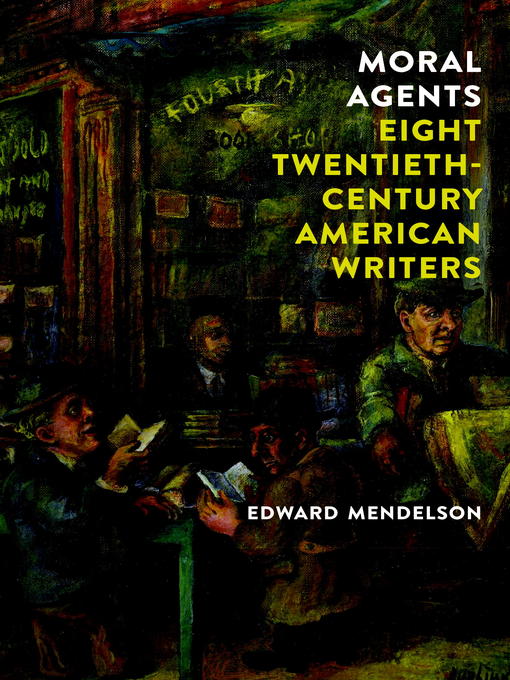A deeply considered and provocative new look at major American writers—including Saul Bellow, Norman Mailer, and W.H. Auden—Edward Mendelson’s Moral Agents is also a work of critical biography in the great tradition of Plutarch, Samuel Johnson, and Emerson. Any important writer, in Mendelson’s view, writes in response to an idea of the good life that is inseparable from the life the writer lives.
Fusing biography and criticism and based on extensive new research, Moral Agents presents challenging new portraits of eight writers—novelists, critics, and poets—who transformed American literature in the turbulent twentieth century. Eight sharply distinctive individuals—inspired, troubled, hugely ambitious—who reimagined what it means to be a writer.
There’s Saul Bellow, a novelist determined to rule as a patriarch, who, having been neglected by his father, in turn neglected his son in favor of young writers who presented themselves as his literary heirs. Norman Mailer’s extraordinary ambition, suppressed insecurity, and renegade metaphysics muddled the novels through which he hoped to change the world, yet these same qualities endowed him with an uncanny sensitivity and deep sympathy to the pathologies of American life that make him an unequaled political reporter. William Maxwell wrote sad tales of small-town life and surrounded himself with a coterie of worshipful admirers. As a powerful editor at The New Yorker, he exercised an enormous and constraining influence on American fiction that is still felt today.
Preeminent among the critics is Lionel Trilling, whose Liberal Imagination made him a celebrity sage of the anxiously tranquilized 1950s, even as his calculated image of Olympian reserve masked a deeply conflicted life and contributed to his ultimately despairing worldview. Dwight Macdonald, by contrast, was a haute-WASP anarchist and aesthete driven by an exuberant moral commitment, in a time of cautious mediocrity, to doing the right thing. Alfred Kazin, from a poor Jewish émigré background, remained an outsider at the center of literary New York, driven both to escape from and do justice to the deepest meanings of his Jewish heritage.
Perhaps most intriguing are the two poets, W.H. Auden and Frank O’Hara. Early in his career, Auden was tempted to don the mantle of the poet as prophet, but after his move from England to America he lived and wrote in a spirit of modesty and charity born out of a deeply idiosyncratic understanding of Christianity. O’Hara, tireless partygoer and pioneering curator at MoMA, wrote much of his poetry for private occasions. Its lasting power has proven to be something different from its avant-garde reputation: personal warmth, individuality, rootedness in ancient traditions, and openness to the world.
-
Creators
-
Publisher
-
Release date
March 10, 2015 -
Formats
-
OverDrive Read
- ISBN: 9781590178065
-
EPUB ebook
- ISBN: 9781590178065
- File size: 1066 KB
-
-
Accessibility
No publisher statement provided -
Languages
- English
-
Reviews
-
Publisher's Weekly
April 27, 2015
Mendelson takes a fascinating look at the public personas and private selves of eight well-known male writers in 20th-century America, profiling them in relation to literature and the larger culture. The book begins with cultural critic Lionel Trilling, a "quietly dominating figure," and his belief that he had failed to be his true self in his writings and public life. Mendelson goes on to discuss the ways that Trilling's work was affected by his troubled marriage to Diana Trilling. The other profiles feature critics Dwight Macdonald and Alfred Kazin; authors Saul Bellow, Norman Mailer, and William Maxwell; and poets W.H. Auden and Frank O'Hara. Each profile comes with a headingâ"Sage" for Trilling, "Mythmaker" for Mailer, "Outsider" for Kazinâthat describes in some way the writer's public image, though Mendelson often suggests that a one-word label can't provide the whole picture. He draws on letters, essays, short stories, passages from novels, and poems to explore his subjects' personal beliefs, such as how Auden related his Christian faith to his homosexuality. The essays on Maxwell, Trilling, and Auden are more engaging than the others, but all offer welcome insight into the lives and impact of the authors. -
Library Journal
February 1, 2015
Growing out of a series of articles originally commissioned by the New York Review of Books, this volume investigates the themes of morality and power in the lives of eight writers whose works exerted a significant influence on American literature and culture in the latter half of the 20th century: Lionel Trilling, Dwight Macdonald, Alfred Kazin, William Maxwell, Saul Bellow, Norman Mailer, W.H. Auden, and Frank O'Hara. Mendelson (Lionel Trilling Professor in the Humanities, Columbia Univ.; The Things That Matter: What Seven Classic Novels Have To Say About the Stages of Life) has heavily revised the original pieces and added much new material, including information gleaned from recently published letters and diaries. Each chapter contains a biographical profile and an assessment of the writer based on his response to some of the burning issues of the day, from the rise of communism to the sexual revolution. Mendelson's focus on "the conflicts between the inward, intimate private lives of the eight authors and the lives they led in public" ties the essays together; several of the authors (Trilling, Kazin, Mailer, and Bellow), it should be noted, faced a unique issue: their need to wrestle with their identification as Jews. VERDICT Those interested in the role these writers played as public intellectuals--and in the larger issue of the relationship of literature to politics--will welcome this engaging read.--William Gargan, Brooklyn Coll. Lib., CUNY
Copyright 2015 Library Journal, LLC Used with permission.
-
Formats
- OverDrive Read
- EPUB ebook
subjects
Languages
- English
Loading
Why is availability limited?
×Availability can change throughout the month based on the library's budget. You can still place a hold on the title, and your hold will be automatically filled as soon as the title is available again.
The Kindle Book format for this title is not supported on:
×Read-along ebook
×The OverDrive Read format of this ebook has professional narration that plays while you read in your browser. Learn more here.


